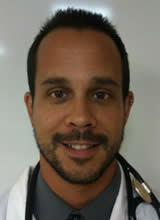
“You are going to die today,” I kept thinking. But I couldn’t get the words out. I’ve never had to say those exact words to a patient before. I’ve told dozens of patients they have an incurable disease that will ultimately claim their life. It’s an abstract concept at that point. Farther down the road in the distant future, you’ll whisper “Rosebud” and fall into a deep sleep. There will be time to make amends, say good-bye, ask for forgiveness. Then finally one day is the day you die.
For Julien, that day had arrived.
Most patients are only half-conscious on the day of their death. Through the illness or fatigue or heavy doses of painkillers, they are drowsy and only faintly aware of their surroundings. In more lucid moments they usually focus on asking for medications to alleviate their symptoms, or superficially interact with the family in the room.
When I enter the room, it’s because the family has asked to speak to the doctor about their loved one’s symptoms or their state of being. The patient breathes deeply in the background, the focus of the conversation but not the focus of attention. We may discuss what the next steps are in seeking a cure or the next steps in keeping the patient comfortable. “Anything that we do at this point may prolong his life, but there is no cure. He will not have any meaningful quality of life and will spend the rest of his time in the hospital. Did you ever discuss with him what he would have wanted to do in this situation?”
Julien knew he had pancreatic cancer and that it would eventually take his life. He had decided several weeks ago to be kept comfortable during his last days and forego the prolonged agony of a futile ICU stay. I was the doctor covering the palliative care service at night, and I had been called by the nurse because he continued to vomit despite maximum doses of three medications.
Julien had complete consciousness, but he was weak, his gown covered in black vomit and his face pale underneath closely cropped gray hair. In many ways the consciousness was a gift so he could say his goodbyes and find peace, but it came at a price. He spit up black vomit, and I wiped his mouth with a towel, smearing some into his white stubble. I had to use the back of the towel to complete the job. I sat on the edge of his bed and placed my hand over the back of his bony hand. “Why do I keep vomiting?” he asked, sitting upright in bed, trying to get comfortable.
“The lab results show that you’re bleeding internally. You are vomiting up that blood, probably from the tumor invading your stomach.” The tests showed that the bleeding would continue to accelerate until he bled to death in the next few hours.
“What can we do to stop it?” He sat up and spit into the basin, and then lay back in bed.
“There is nothing we can do to stop the bleeding. I’m going to ask the nurses give you two more medications to try to stop the vomiting and reduce your pain, but they will make you very sleepy and make it harder to communicate with your family.” I changed the subject, trying to focus on the immediate symptoms.
“But then what will happen with the bleeding?” he asked.
“It will continue to happen and get worse until…” I searched for the right words. “I think it’s time to have your family gather around your bedside.” To say good-bye. I recalled an 18th century painting in drab grays and earth tones that showed a dying man with his family gathered at the bedside, holding his hand. The dying man’s other hand hangs off of the bed listlessly while the doctor packs up his things.
He looked up at me and said, “What does that mean, Doc?” His head lolled on his chest again, his eyes shut.
“There is nothing more we can do for you. We can do more to keep you comfortable, but I’m not sure how long we can maintain that state.” Say it. Just say it. “So it’s time to have your family come to your bedside, and be with you.” How can I possibly tell a man that today is his last day on earth while he looks me in the eye?He tried to hold his head up and make eye contact, then tired of the effort. “Well, that sucks,” he said. He understood. We sat in silence for a moment, and then he turned his hand over, pressing his clammy palm against mine. “I guess I thought there would be more time.”
“I can call your wife and tell her to come in. Is there anyone else you want to be with you?”“My son. But she’ll know that.” He tossed around in bed, but no position was better than any other. He was far away, running a to-do list in his head. After a few moments of thought, he lifted his brow and threw his hands up, releasing my grip. “Huh. Today.” he shrugged. “Can I have those medications now, Doc?”
Vincent DeGennaro is an internal medicine doctor and a global public health specialist in the Department of Global Health and Social Medicine, Harvard Medical School. He also works with the international nonprofit organization Partners in Health-Rwanda. See his An American Doctor in Rwanda blogs.